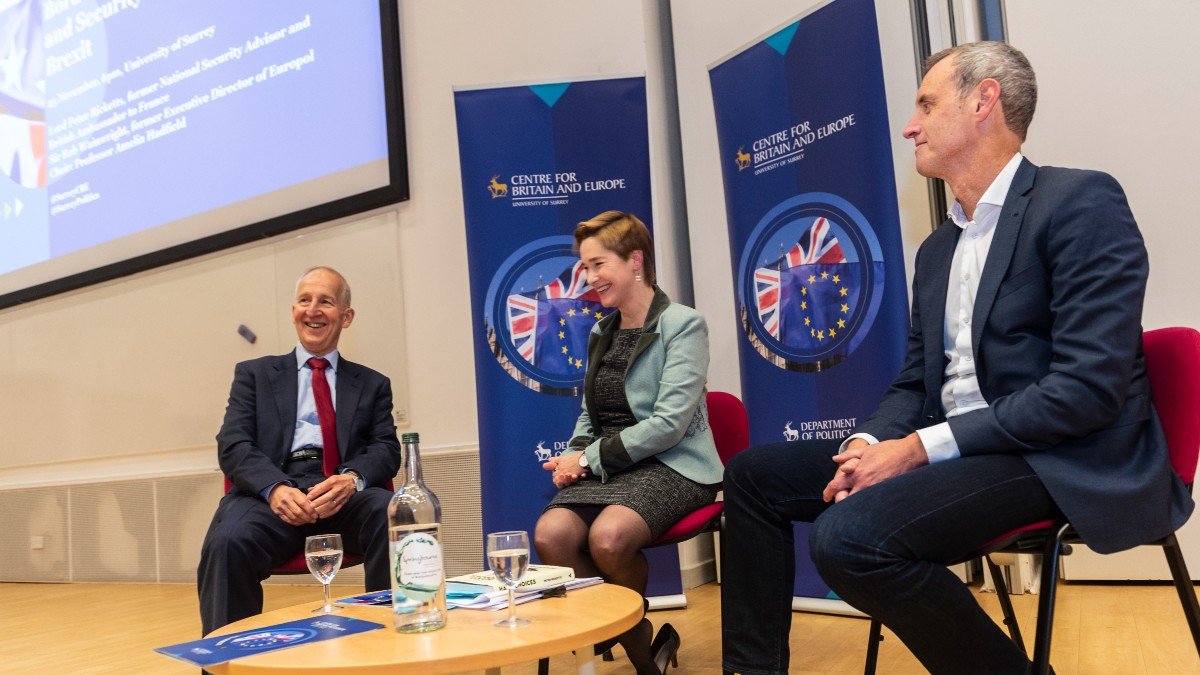Border trouble? UK-EU defence and security cooperation post Brexit
On 25 November, the Centre for Britain and Europe held an event on post-Brexit security cooperation to celebrate the first year of the CBE as a Jean Monnet Centre of Excellence.

The discussion was chaired by Professor Amelia Hadfield, Head of the Department of Politics at the University of Surrey and Co-Director of the Centre for Britain and Europe. Amelia was joined by Sir Rob Wainwright, former Executive Director of Europol, and Lord Peter Ricketts, crossbencher in the House of Lords and the UK’s first National Security Adviser.
Lord Peter Ricketts started off the discussion by exploring some of the themes discussed in his recent book Hard Choices: What Britain Does Next. In Hard Choices, Lord Peter uses his experience as a senior diplomat, having served as the UK’s Ambassador to France and as the Permanent Representative to NATO, to analyse the problems ‘Global Britain’ will face after what he calls a ‘perfect storm’. In addition to exiting the European Union, Lord Peter acknowledges that the rise of populism in other parts of the world, as well as recovering from the Covid-19 pandemic, will make it harder for Britain to put together a consistent and unified message in terms of foreign policy. Whilst the UK is a middle-sized power, Lord Peter reflected on the need to prioritise efforts, particularly in terms of relations with China and establishing a clear and cordial line of communication with the EU.
Sir Rob Wainwright followed, focusing on the challenges around security and terrorism that will arise post-Brexit. Sir Rob noted that over the past two decades, globalisation and other geopolitical factors have caused criminals to take advantage of modern technologies, forming a globalised criminal infrastructure. Social media and the dark web have created an environment where criminals can recruit, communicate and trade with each other. Whilst Britain has a strong line of defence against cybercrime, coordination across borders is necessary. The UK will therefore need to think about how it engages with the EU in the area of security.
Lord Peter acknowledged that relations between the UK and France are at the lowest point he has witnessed across the duration of his career. There have been historical disagreements on various issues, but currently, the underlying issue is a lack of trust. There are a number of international agreements that have shown how France and Britain can work closely together on border issues, the economy and culture. Whilst relations will evolve in future, it will take time and will need to be approached in a phasal way.
Analysing the implications of the Trade and Cooperation Agreement (TCA) for security and defence, Sir Rob argued that it could have been considerably worse. There are working arrangements that mean that the UK is still an active participant in Europol. However, certain gaps need to be filled, particularly in terms of accessing EU databases. Nonetheless, Sir Rob feels positive about UK and EU police cooperation.
In a more strategic manner, both speakers touched on the UK’s ability to support the EU’s strategy in terms of autonomy. Whilst Lord Peter believed politicians often are sceptic of strategies that look into the future, he acknowledged that both the UK and EU have different interests. On the other hand, Sir Rob stressed that new threats such as cybercrime and cyberterrorism will eventually create a need for strategic integration between intelligence agencies.
At the end of the discussion, Sir Rob and Lord Peter responded to some very interesting and challenging questions from the audience. Sir Rob highlighted that there is scope to create a different security relationship with Europe and noted that the system is currently resilient thanks to the Schengen Information System. Lord Peter discussed the importance of languages in diplomacy and that the UK will still have the “power of the pen” due to the widespread use of English in written communiqués and treaties.
We would like to thank Sir Rob Wainwright and Lord Peter Ricketts for taking the time to visit the University of Surrey. The discussion was incredibly thought-provoking and was the perfect way to celebrate the first year of the Centre of Britian and Europe as a Jean Monnet Centre of Excellence.
Article by David Tillo and Evie Horner, Jean Monnet studentship holders 2021-2022
